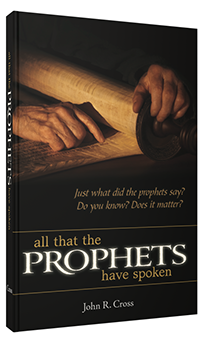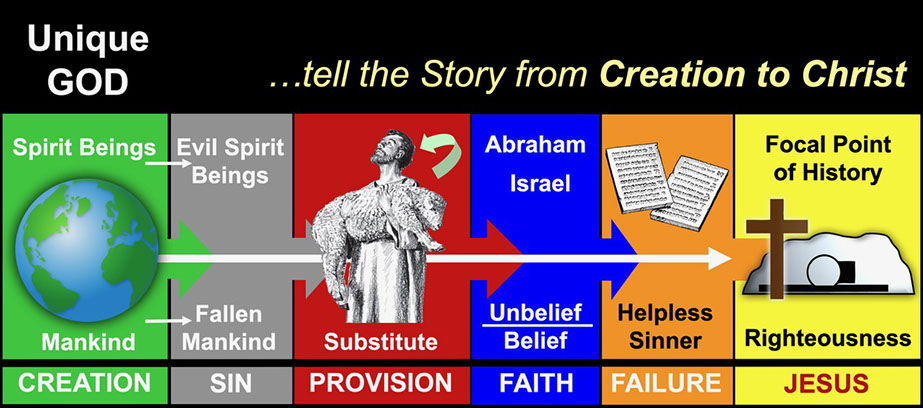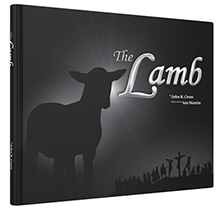THE TOOLS WE CREATE ARE WORLDVIEW SENSITIVE
ONE MESSAGE, FIVE WORLDVIEWS


THE STRANGER
ON THE ROAD TO EMMAUS
Audience:
For those influenced by Christianity—whether Protestant, Catholic or Orthodox. When they hear the word “God”, they think of the God of the Bible.
Pages: 285
Bible verses: 1177


ALL THAT THE PROPHETS HAVE SPOKEN
Audience:
For those influenced by Islam, but not necessarily Muslim by belief. When they hear the word "God", they think of Allah of the Koran.
Pages: 279
Bible verses: 1244


BY THIS NAME
Audience:
For those influenced by polytheism, pantheism, atheism, agnosticism and animism. When they hear the word “god” they think of many spirits or gods. Others think of “Let the force be with you.” Some will deny the existence of a god or say you cannot know. Also includes those with New Age, post-modern, post-Christian or secular ideas.
*See definitions below
Pages: 377
Bible verses: 1569


NO ORDINARY STORY - THE SERIES
Abridgement:
25% shorter than The Stranger on the Road to Emmaus
44% shorter than By This Name.
Audience:
For those who consume information in small bites. When they hear the word “god” they are indifferent or skeptical. Includes those with postmodern or post-Christian ideas.
Size: Core message is found in eight booklets, 40 pages per booklet, excluding appendixes. Additional booklets expand beyond the core set.
Bible verses: 1028

PUZZLED ABOUT WORLDVIEWS?
A question to ask
“When you hear the word 'God' what do you think of?"
If the answer includes a powerful person or being as described in the Bible, then you are facing a Christianized Worldview.
If the answer is Allah as explained in the Koran, then you are facing the Islamic Worldview.
If the answer sounds like “Let the force be with you,” or includes many gods and goddesses, then you are facing the Eastern Worldview.
If they don’t know or seem indifferent, then you are facing the Secular Worldview, which may include atheistic or agnostic ideas.
The right tool for the right audience helps communicate a clear gospel. When the gospel is understood, it is life-changing.
WHAT IS A WORLDVIEW?

A worldview is the overall perspective from which a person sees and interprets the world.
A pair of eyeglasses helps us see the world. If we have a different prescription, the world looks different. If we wear sunglasses, our view of the world changes. In the same way, our worldview is made up of our beliefs and they help us to interpret and make sense of life. A worldview helps a person answer the big questions in life. For example:
Where did we come from?
This is a question of origins.
Why are we here?
This is a question about the purpose of life.
What happens after we die?
This is a question about life after death.
How do we know what is right and what is wrong?
This is a question about the source of moral authority.
How we answer these questions, affects how we live. This is our worldview.




WHY DOES A WORLDVIEW MATTER?

A person’s worldview affects the way he or she interprets and understands the message of the Bible.
Just the first four words of the Bible can create problems for people of different worldviews.
For example, a person with an eastern worldview may not believe in a beginning of the world but in endless cycles of life. So how will they understand the phrase, "In the beginning God..."?
Another person may have no problem with “in the beginning,” but she may have a problem with the word “God.” She may have another god or several other gods in mind. What god is the Bible referring to?
In light of this, how do we ensure that others from a different worldview understand correctly what the Bible says about itself?
WORLDVIEW SENSITIVE APPROACH





To give a clear and objective presentation of the Scriptures, we start off by assuming the audience knows nothing about the Bible.
Then we begin at the beginning, with the creation of world and revealing the character of God through his actions.
We build good foundations and provide the context to explain the unfolding biblical narrative.
As we do, we gently address specific questions that arise from different worldviews.
We therefore have different tools to address different worldviews.
* DEFINITIONS

Agnosticism
The belief that it is impossible to know if there is a God or not.
Animism
The belief that inanimate objects, animals, plants, and natural features such as rivers and mountains, and natural phenomena such as wind and thunder are alive, and can experience feelings and intentions, and have souls. Though animism is common among primitive people groups, it has also influenced modern culture. The need to placate and manipulate spirits, especially ancestral spirits, is a common feature of animism.
Atheism
The belief that there is no God, supreme beings or spirits.
New Age
A cultural and personalized attitude that is inclusive and diverse, with beliefs drawn from a variety of modern and ancient cultures. Beliefs include supernatural elements, self-help, motivational psychology, holistic health, reincarnation, pantheism and paranormal phenomena.
Pantheism
The view that everything and everyone is God. James Cameron’s movie “Avatar” (2009) is a prime example of pantheism. A pantheistic person might speak of finding “paths to enlightenment” or “a higher truth.”
Polytheism
The belief in or worship of multiple gods. A person influenced by polytheism may say, "...Sure I believe in God but at the same time, I still believe in in other gods or spirits."
Postmodernism
The view that everything is relative, so there are no ultimate principles, no absolute truth and no objective reality. What a person experiences as reality is created by our individual minds and consists of our own interpretations. “You have your beliefs, I have mine” is something you may hear from someone influenced by postmodernism.
Secularism
The view that human decisions, especially political ones, should not be influenced by religion. In discussions about world problems, this person may prefer to focus on scientific findings and human reason instead of any kind of spiritual discussion.
People may hold to any combination of these beliefs.

Syncretism
This is a mixing of ideas or beliefs, even if some of the ideas are contradictory.
I WANT TO LEARN
ABOUT GOODSEED
The Monthly
GoodSeed eNewsletter
Sign up to receive articles, testimonies, sneak peeks of new resources & upcoming seminars. You'll receive a PDF copy of The Tabernacle: Model of Messiah as a thank you for partnering with us.
© 2023 GoodSeed International. All rights reserved.





